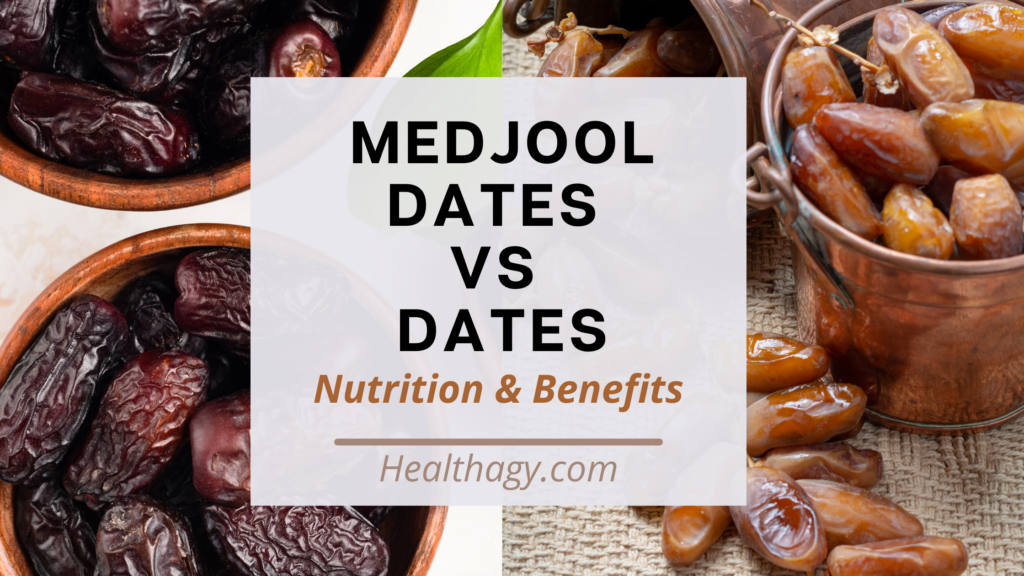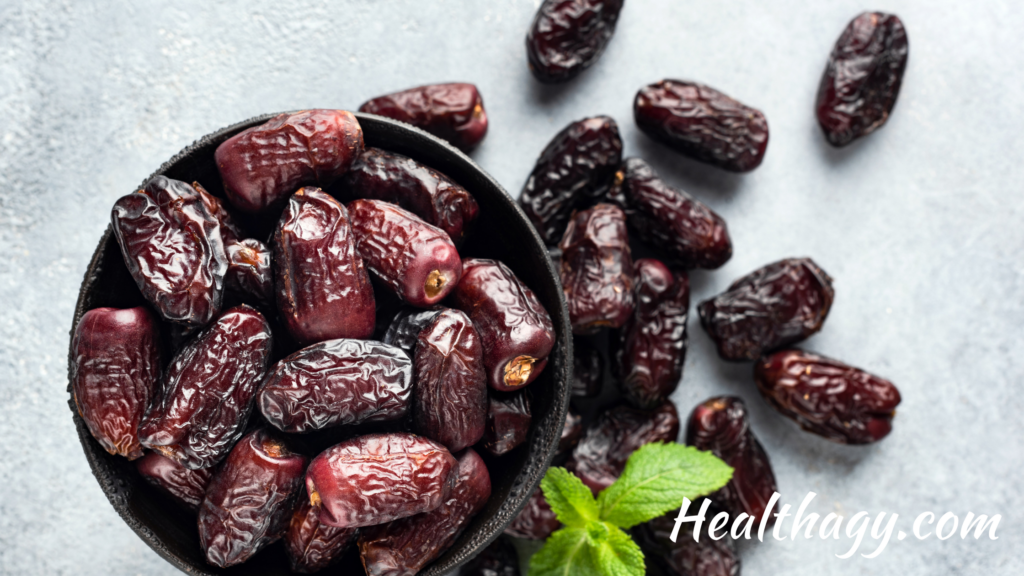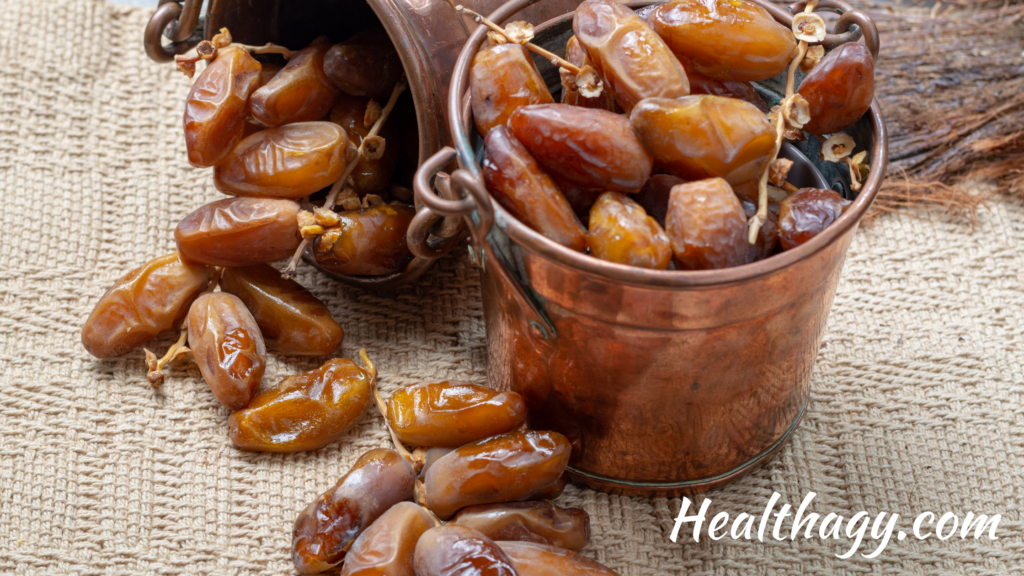
Dates are a sweet fruit with many health benefits and healing properties, some people even consider dates to be a superfood! As people continue to trade in artificial sweeteners and processed sugar for natural sweeteners, dates have gained even more popularity over the years.
While there are several varieties of dates available in grocery stores, in this blog post, we’ll focus on the difference between Medjool dates vs dates. Regular dates are also known as Deglet Noor dates.
Key Differences in Medjool Dates vs Dates
The main difference between Medjool dates vs dates is that Medjool dates are sweeter in taste than regular dates. Medjool dates are used as a natural sweetener andare darker, larger, and softer, with a more caramel-like taste than regular dates.
Medjool dates go well with food dishes such as salads and sandwiches to add a sweet complement to the dish.
Deglet Noor dates are less sweet in flavor and have a chewier texture they work well in baked goods because of their modest sweetness and can also be used as a natural sweetener.

What are Medjool Dates?
Medjool dates, given the scientific name of Phoenix dactylifera, are known as the king of dates. They were once reserved only for royalty and their guests.
Medjool dates originated in Morocco and are now grown in warm climates of the Middle East, U.S., Africa, and Southern Asia.
Dates are categorized into three types: soft dates, semi-dry and dry dates. Medjool dates are considered a soft date, meaning they have a soft texture. They are amber to reddish-brown in color and typically larger than regular dates.
Medjool Dates Taste
Medjool dates have a sweet taste, much sweeter than other dates, having a caramel taste. They are commonly referred to as “Bakers Choice” as they are incredibly sweet. Medjool dates are used to make natural sweeteners and syrups and used in lieu of sugar when baking. They are often used as a natural sugar substitute and seen as a healthy alternative to regular sugar, processed and artificial sweeteners.
Medjool dates are typically sold dried but not dehydrated. This makes them soft, sticky, and sweet. As they dry, their sugars become more concentrated as they dry, making them even sweeter in taste.

What are Dates?
Dates are a type of fruit with many health benefits and healing properties. Dates are a sweet-tasting fruit grown on date palm trees and are typically found in warm and tropical regions such as the middle east.
There are many different date varieties, although varieties in the U.S. are more limited. Those who live in the middle east where dates have been a staple fruit for centuries have a larger variety of dates available at markets. In the United States, the two most common types of dates are Medjool dates, mentioned earlier in this post, and Deglet Noor dates. The Deglet Noor dates are the most common date and are considered to be the standard or “regular dates.”
Deglet Noor dates are light brown or yellow to light amber in color, having a chewy texture & rich, caramel-honey taste.
Dates Taste
The Deglet Noor dates are a semi-dry type of date, with a pliable texture, yet slightly crunchy. Deglet Noor dates are less sweet than the Medjool dates. They are incorporated into recipes and baking as a whole date to chopped up and diced, rather than a date syrup.
The taste of Deglet Noor dates can also be compared to cashew nut butter or browned butter, having a slightly nutty finish.
Dates Nutritional Profile
Medjool and Deglet Noor dates have similar nutritional profiles and health benefits. Dates are rich in antioxidants, fiber, and potassium. When eaten in moderation, as they are high in calories and natural sugars, they can make a great addition to a healthy diet.
Nutritional Profile Source
| Medjool Date (1 oz, 28 g), %Daily Value | Deglet Noor Date (1 oz, 28 g), %Daily Value (approximately 14 dates) | |
| Calories | 79 | 80 |
| Total Carbohydrate -Dietary fiber -Sugar | 21.3 g 1.9 g 18.8 g, 38% | 21.3 g 2.3 g 18 g, 36% |
| Cholesterol | 0 mg | 0 mg |
| Protein | 0.5 g, 1% | 0.7 g, 1% |
| Total Fat Saturated Fat | 0 g 0g, 0% | 0.1 g 0 g, 0% |
| Vitamin D | 0 mcg | 0 mcg |
| Calcium | 18.1 mg | 11.1 mg |
| Iron | .0.3 mg | 0.3 mg |
| Potassium | 197.3 mg, 4% | 186 mg, 4% |
Dates Health Benefits
Medjool dates offer more calcium than other dates, but otherwise, Medjool dates along with other dates carry similar health benefits.
Full of Nutrients
Dates are a great source of potassium, magnesium, copper, manganese, and vitamin B6. They are also rich in antioxidants.
Great Source of Fiber
Dates are a good source of dietary fiber. Fiber helps support digestive health. On average, one Medjool date contains about 1.6 grams of fiber, which is about 6% of the daily value recommended.
Rich in Antioxidants
Dates are a rich source of antioxidants, which helps protect the cells from free radicals, slow the aging process, and fight diseases. Three antioxidants dates are particularly high in include flavonoids, carotenoids, and phenolic acid.
Flavonoids are antioxidants that help reduce inflammation. Carotenoids help promote heart health and eye health. Phenolic acid contains anti-inflammatory properties and may help lower the risk for cancer and heart disease.
Healthy Substitute for Sugar
My favorite use of dates is as a natural sweetener. Opting for natural sugars over processed sugars and white sugar can greatly benefit one’s health.
Dates are very sweet with a caramel-like taste. They make a great substitute for white sugar as they also provide nutrients, antioxidants, and fiber.
You can use dates in baking or use a date paste, which is a mixture of dates and water. Date paste is easy to make at home or you can purchase it online or in a specialty store that is more health-focused, although some grocery stores may carry it. Substituting date paste for sugar is a 1:1 ratio.
Although Medjool dates have a higher level of natural sugar when they’re ripe, they have a low glycemic index. So there typically isn’t a sudden increase in blood sugar levels. However, always consult your doctor on how to best manage any health issues or related concerns around blood sugar management.
Key Takeaways
Dates are the fruit of the date palm tree. They can make a great healthy snack and are a healthier option than regular sugar for satisfying a sweet tooth with their natural sweetness. You can eat whole dates as a snack or add in recipes or use dates to make a paste that can be used as a substitute for sugar.
Karla Kueber is a Certified Evidence Based EFT Practioner and Health Coach, with a double Masters Degree in Education. She works with people to overcome emotional eating, curb cravings, and overcome resistance to eating new healthy foods. You can learn more about coaching with her here.